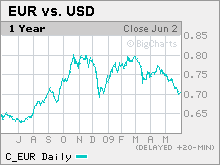Dollar falls against euro on ECB decision
European Central Bank and Bank of England hold rates unchanged. Trichet says it's important that Washington supports dollar.
NEW YORK (Reuters) -- The euro rose against the dollar in volatile trade on Thursday following the European Central Bank's decision to keep the benchmark interest rate unchanged at a record low of 1%.
Despite the central bank's expectations for a much sharper recession in the euro zone this year than previous forecasts, ECB president Jean-Claude Trichet maintained market expectations that the central bank would not cut interest rates below the current level.
The bank also reiterated plans to buy 60 billion euros in covered bonds, spread across the euro zone, in both primary and secondary markets. The bonds would be rated AA or equivalent.
A comment by Trichet at a news conference after the bank's policy meeting, that it was important that Washington had expressed support for a strong dollar, helped mute losses in the greenback.
The pound was lower against the dollar after the Bank of England also left its benchmark rate unchanged.
"Trichet's not giving an inch as far as encouraging any loosening expectations, said Boris Schlossberg, director of FX research at GFT Forex in New York. "Some in markets wanted to see a hint of another 25 basis-point cut in the second half. He's admitted they'll have negative growth this year but says it will recover in 2010."
The euro was last up 0.2% at $1.4196, according to electronic trading platform EBS , having swung between a peak of $1.4242 and a low $1.4070 over the global session.
Euro trading "is just a 50-point move on whatever the most recent statement was," said John McCarthy, director of foreign exchange at ING Capital Markets in New York. "All of the statements by central bank chiefs were pretty benign though sober: a recovery in 2010 but anemic."
Trichet said he appreciated the U.S. government's "strong dollar" statements.
"I would say it's very important, and we appreciate enormously that the U.S. authorities are repeating that a strong dollar is in the interests of the United States of America, which has been repeated by the Secretary of the U.S. Treasury recently," Trichet said.
The dollar index, which measures the dollar against a basket of six currencies, was 0.3% lower at 79.256.
Earlier, the Bank of England left key rates unchanged at a record low 0.5 % and stuck to its 125 billion pound target for quantitative easing, as expected.
The pound was last 0.6% lower against the dollar at $1.6200, according to Reuters data.
The Canadian dollar first dipped against the U.S. currency on Thursday after the Bank of Canada kept rates unchanged, as expected, but acknowledged the economic threat posed by the recent sharp appreciation of the Canadian currency.
The Canadian dollar later recovered and the U.S. dollar was 1.4 % lower at C$1.0966 , according to Reuters data.
The Canadian central bank made no mention in its statement of unconventional monetary policy easing, such as printing money to buy securities, signaling it maintains the view that further stimulus is not required anytime soon.
The Swedish crown rebounded from 6-week lows against the euro, prompted by concerns Latvia may devalue its currency.
The euro fell 0.6 % to 10.8410 crowns, according to Reuters data, after earlier hitting a six-week low against the euro of 10.9832 per euro on hopes of fresh IMF support for Latvia. The Swedish currency is highly sensitive to any trouble in Baltic countries because of the substantial exposure of Swedish banks to the region.
The problems in Latvia are not resolved, and there is a chance of a currency devaluation in Latvia this year, said Michael Woolfolk, senior currency strategist at Bank of New York-Mellon in New York.
"At this stage there is a good chance a devaluation could spread to other parts of emerging Europe as well as other emerging regions," he said. ![]()




